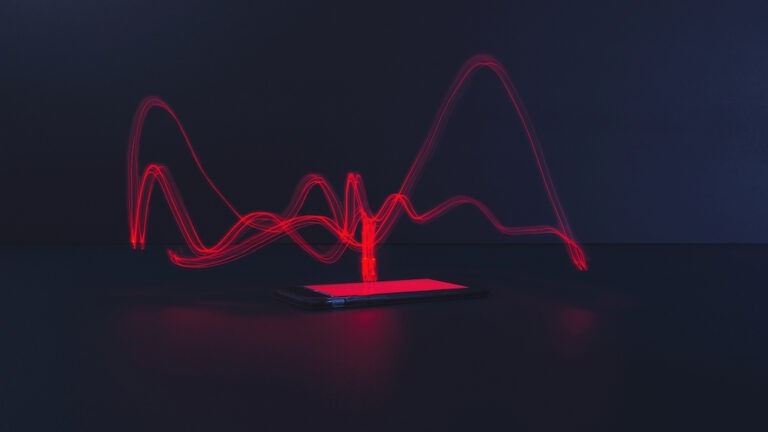10 Highest Radiation Cell Phones & How to Protect Yourself

Cell phones have become ubiquitous pieces of technology in our lives. About 96% of Americans now own at least one cellular device, if not multiple. And while we’re constantly reassured that these devices are physically safe and pose no risk of harm, cell phones and smartphones do give off a certain amount of radiation. In fact, when looking at the fine print of any cell phone user manual, you should find a warning telling you to keep your phone at least two inches away from your body at all times to avoid radiation exposure.
These potentially harmful radiation levels are measured in units called SARs, or the Specific Absorption Rate of the radiofrequency energy emitted by a device.
Is Cell Phone Radiation Dangerous?
Could your cell phone use be giving your body unhealthy amounts of radiation? Mobile phones use electromagnetic radiation in the microwave range. Other digital wireless systems, such as data communication networks, produce similar radiation.
According to the International Agency for Research on Cancer (IARC) in 2011, mobile phones were classified as Group 2B – possibly carcinogenic (not Group 2A – probably carcinogenic). That means there “could be some risk” of carcinogenicity, so additional research into the long-term, heavy use of smartphones needs to be conducted. However, with 5 billion cell phone users worldwide (260 million alone in the U.S.) answers should probably come sooner than later.
Although no conclusive evidence has been produced, some experts, like Dr. George Carlo, former chief scientist of the cell phone industry’s $28 million safety research project, believes we could be on the verge of a major health crisis. Specifically, he believes the world could be on the precipice of 500,000 brain and other cancer cases annually, because of the proliferation – and rising power – of cell phones and smartphones.
Some health ailments that experts have already theoretically attributed to high cell phone use include increased headaches, high blood pressure, earlier onset of Alzheimer’s, and cancer. Additionally, concern for men’s health regarding cell phones has made international headlines. A meta-analysis of ten past studies, led by researchers at the University of Exeter, U.K., found a small but consistent drop in sperm quality if the men had been exposed to mobile phone radiation. While researchers found no link between mobile phone radiation and an actual drop in fertility rates, the finding could contribute to understanding the global — and still unexplained — drop in sperm count.
What’s a Safe Level of Cell Phone Radiation?
For a phone to pass FCC certification and be sold in the United States, its maximum Specific Absorption Rate, or SAR rating must be less than 1.6 watts per kilogram.
The SAR levels listed below represent the highest SAR levels measured with the phone next to the ear of a dummy specifically designed with fluids inside that simulate a human head. These results come from the German Federal Office for Radiation Protection, (Bundesamt Für Strahlenschutz) on statista.com which conducts the most comprehensive study of cell phones based on their universal guideline or environmental friendliness standard known as the Der Blaue Engel, or Blue Angel—the SAR level they believe is safest at .60 W/kg.
Note that it’s possible for the SAR level to vary among different transmission bands (the same phone can use multiple bands during a call), and different testing bodies can obtain different results.
Top 10 Phones with Highest Radiation
1. Xiaomi Mi A1
SAR: 1.75 W/kg radiation
2. OnePlus 5T
SAR: 1.68 W/kg radiation
3. Xiaomi Mi Max 3
SAR: 1.58 W/kg radiation
4. OnePlus 6T
SAR: 1.55 W/kg radiation
5. HTC U12 life
SAR: 1.48 W/kg radiation
6. Xiaomi Mi Mix 3
SAR: 1.45 W/kg radiation
7. Google Pixel 3 XL
SAR: 1.39 W/kg radiation
8. OnePlus 5
SAR: 1.39 W/kg radiation
9. Apple iPhone 7
SAR: 1.38 W/kg radiation
10. Sony Xperia XZ1 Compact
SAR: 1.36 W/kg radiation
Is Android Safer Than Apple?
This is a tricky question as Android refers to the operating system used by the phone and most cell phone and smartphone manufacturers that aren’t Apple use the Android operating system. So if we were to say based on the list above, whether Apple phones are ranked less often than Android phones, the answer would be yes.
But when judging whether a cell phone has more or less radiation, that depends on the particular model of the phone, not the phone’s operating system
How Can I Check My Phone’s Radiation Level?
Referring to the German certification’s comprehensive list is likely the best place to find your cell phone’s level of radiation. The organization has studied and published SAR values for almost every cell phone you can purchase.
The FCC and FDA also share regulatory responsibilities for measuring SAR levels of consumer cell phones. More information can be found here on the FCC’s website and here on the FDA’s website.
Dangers of 5G
With the advent of 5G technology being implemented across the world, concerns have been elevated over the short millimeter wave-length frequencies that will be emitted by 5G towers. Though preventing this installation of 5G seems futile, there may be ways to mitigate its effects.
In terms of 5G cell phones, most of the newest cell phones are equipped to utilize the new technology, though they aren’t necessarily more or less radiative. For more info on the potential dangers of 5G check out this article.
Ways to Protect Yourself from Phone Radiation
Decrease Your Screen Time
Watch how much time you spend on your cell. Try to make your calls only the most necessary ones, and when you do use it, try to follow a two-minute rule of thumb. Research has shown that a short, two-minute call can alter the natural electrical activity of the brain up to one hour.
Text More Often
Text instead when you can. Obviously, don’t try this behind the wheel or any other time you need your full attention, but when a text will suffice, send one instead of dialing.
Buy a New Cell Phone
Swap out your high radiation cell for one with the least radiation or lowest SAR level. If your phone is on the list, make the switch. It’s worth paying an extra cost in order to preserve one of the most valuable things you have: your health.
Use a Headset or Speaker
Use a headset or speaker. Right now, there isn’t enough research to determine whether using a speaker or headset, rather than your phone itself, offers better protection. But one thing is known: the electromagnetic waves emitted by your phone are absorbed most often received by the temporal lobe of your brain, during normal usage (phone to your ear), and that part of your brain handles hearing, auditory processing, the formation of long-term memory, speech, and vision.
Keep at a Distance
Keep your phone away from your body and your waist during use. Again, it’s a device that emits and transmits electromagnetic waves that are absorbed by the soft tissues in your body. One study suggested that men who wear their cell phones near their waste could see their sperm count reduced by as much as one-third.
Delay Your Usage
Delay your use. If you’re using your phone without a headset, wait for your call to connect before putting it next to your ear. You can also wait until you’re able to use WiFi instead of your cellular data, as it’s less harmful.
Avoid Use in Metal Boxes
Avoid use in metal boxes. This sounds like funny advice, but using your phone in environments like an elevator or your car cuts signal strength and forces the phone to use more power to connect, which means it’s sending out even more radiation.
Avoid Weak Signal Areas
Try not to dial on a weak signal. If your cell signal is down to a few bars, consider waiting to use your phone. Again, it’s a power thing: less signal means more power is required for use.
Avoid Harmful EMFs
Shield yourself from EMFs (electromagnetic fields). You can do that by purchasing a scientifically validated EMF protection device or magnet. Doing so will strengthen your bioenergy field and immune system against the harmful effects of EMFs.
Take Your Vitamins
Support your body with proper nutrition. Think about supplementing your nutritional diet with antioxidants such as catalase, glutathione, and Coq10. You can also supplement with melatonin, Zinc, and Gingko Biloba.
Stem Cells From One's Own Body Show Efficacy in Treating Pain

Stem cell therapy is still a relatively new concept that few understand, but it continues to garner a lot of support and promise — especially for medical problems that have traditionally been very difficult to treat. In his fascinating discussion with Open Minds host Regina Meredith, naturopathic doctor Harry Adelson N.D. reveals a new way to address pain by using stem cells as curative agents. This may come as a welcome idea for at least a fifth of the population, who suffer from chronic pain that affects quality of life, the ability to work, sleep patterns, and more.
According to the Mayo Clinic stem cells create other cells with specialized functions, and “[u]nder the right conditions in the body or a laboratory, stem cells divide to form more cells called daughter cells. These daughter cells either become new stem cells (self-renewal) or become specialized cells (differentiation) with a more specific function, such as blood cells, brain cells, heart muscle cells or bone cells. No other cell in the body has the natural ability to generate new cell types.”
Adelson, says treatment with stem cells can help treat musculoskeletal pain and increase energy using cells from one’s own bone marrow and fat to prompt regeneration. Citing his own use of stem cells on his road to recovery from injury and pain, Adelson says how regenerative therapy using biological tissues found in the human body can restore normalcy to someone living with pain and suffering.
One of the more exciting aspects of stem cell therapy is that each of us can create our own cells to heal ourselves. Emerging evidence suggests that adult stem cells can not only replicate, but also create various other types of cells. For example, bone marrow stem cells may be able to create bone or heart muscle cells.
Adelson is highly experienced when it comes to using stem cells for pain treatment, having performed numerous procedures using bone marrow combined with adipose (bodily fat) stem cells. He’s also injected more than a thousand intervertebral discs with stem cells.
Adelson’s excitement for stem cell therapy began with an accident as a young man, while rock climbing in the early 1990s. He was in naturopathic school at the time, when an injury to his shoulder set him off in a new direction, leading him to pursue an alternative to traditional surgery and injections for pain treatment. After receiving his naturopathic degree, Adelson discovered the potential of stem cell therapy.





































